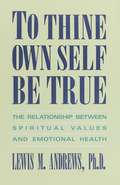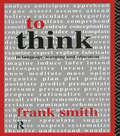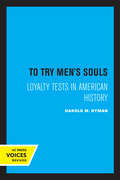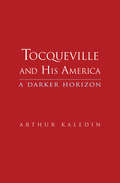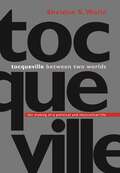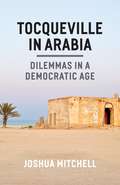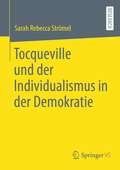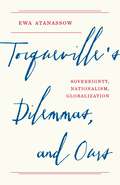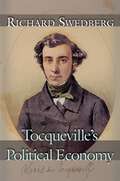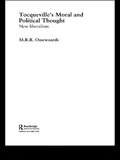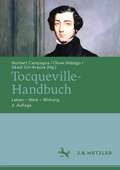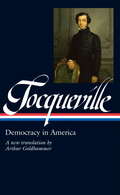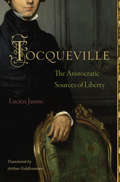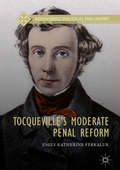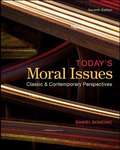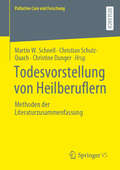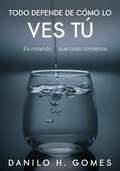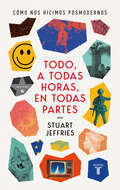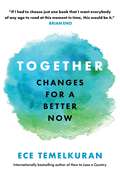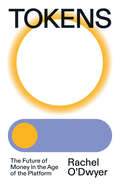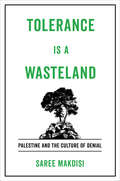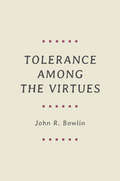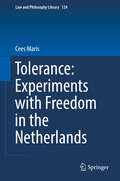- Table View
- List View
To Thine Own Self Be True: The Relationship Between Spiritual Values and Emotional Health
by Lewis M. Andrews"There is a newfound confidence and enthusiasm for living. But perhaps the most remarkable development of all is the recognition that this spiritual therapy is not really a new discovery, revealed by some outside authority, as much as it is a reminder of the basic truths we have always known in our own hearts. In healing ourselves, we learn that the greatest wisdom of all lies not in listening to others but in being true to our deepest selves".
To Think: In Language, Learning and Education
by Frank SmithFirst Published in 1992. Routledge is an imprint of Taylor & Francis, an informa company.
To Try Men's Souls: Loyalty Tests in American History
by Harold M. HymanThis title is part of UC Press's Voices Revived program, which commemorates University of California Press’s mission to seek out and cultivate the brightest minds and give them voice, reach, and impact. Drawing on a backlist dating to 1893, Voices Revived makes high-quality, peer-reviewed scholarship accessible once again using print-on-demand technology. This title was originally published in 1959.
Tocqueville and His America
by Arthur KaledinArthur Kaledin's groundbreaking book on Alexis de Tocqueville offers an original combination of biography, character study, and wide-ranging analysis of Tocqueville'sDemocracy in America, bringing new light to that classic work. The author examines the relation between Tocqueville's complicated inner life, his self-imagination, and his moral thought, and the meaning of his enduring writings, leading to a new understanding of Tocqueville's view of democratic culture and democratic politics. With particular emphasis on Tocqueville's prescient anticipation of various threats to liberty, social unity, and truly democratic politics in America posed by aspects of democratic culture, Kaledin underscores the continuing pertinence of Tocqueville's thought in our own changing world of the twenty-first century.
Tocqueville and the Frontiers of Democracy
by Ewa Atanassow Richard BoydAlexis de Tocqueville is widely cited as an authority on civil society, religion and American political culture, yet his thoughts on democratization outside the West and the challenges of a globalizing age are less known and often misunderstood. This collection of essays by a distinguished group of international scholars explores Tocqueville's vision of democracy in Asia and the Middle East; the relationship between globalization and democracy; colonialism, Islam and Hinduism; and the ethics of international relations. Rather than simply documenting Tocqueville's own thoughts, the volume applies the Frenchman's insights to enduring dilemmas of democratization and cross-cultural exchanges in the twenty-first century. This is one of the few books to shift the focus of Tocqueville studies away from America and Western Europe, expanding the frontiers of democracy and highlighting the international dimensions of Tocqueville's political thought.
Tocqueville between Two Worlds: The Making of a Political and Theoretical Life
by Sheldon S. WolinAlexis de Tocqueville may be the most influential political thinker in American history. He also led an unusually active and ambitious career in French politics. In this magisterial book, one of America's most important contemporary theorists draws on decades of research and thought to present the first work that fully connects Tocqueville's political and theoretical lives. In doing so, Sheldon Wolin presents sweeping new interpretations of Tocqueville's major works and of his place in intellectual history. As he traces the origins and impact of Tocqueville's ideas, Wolin also offers a profound commentary on the general trajectory of Western political life over the past two hundred years. Wolin proceeds by examining Tocqueville's key writings in light of his experiences in the troubled world of French politics. He portrays Democracy in America, for example, as a theory of discovery that emerged from Tocqueville's contrasting experiences of America and of France's constitutional monarchy. He shows us how Tocqueville used Recollections to reexamine his political commitments in light of the revolutions of 1848 and the threat of socialism. He portrays The Old Regime and the French Revolution as a work of theoretical history designed to throw light on the Bonapartist despotism he saw around him. Throughout, Wolin highlights the tensions between Tocqueville's ideas and his activities as a politician, arguing that--despite his limited political success--Tocqueville was ''perhaps the last influential theorist who can be said to have truly cared about political life.'' In the course of the book, Wolin also shows that Tocqueville struggled with many of the forces that constrain politics today, including the relentless advance of capitalism, of science and technology, and of state bureaucracy. He concludes that Tocqueville's insights and anxieties about the impotence of politics in a ''postaristocratic'' era speak directly to the challenges of our own ''postdemocratic'' age. A monumental new study of Tocqueville, this is also a rich and provocative work about the past, the present, and the future of democratic life in America and abroad.
Tocqueville in Arabia: Dilemmas in a Democratic Age
by Joshua MitchellThe Arab Spring, with its calls for sweeping political change, marked the most profound popular uprising in the Middle East for generations. But if the nascent democracies born of these protests are to succeed in the absence of a strong democratic tradition, their success will depend in part on an understanding of how Middle Easterners view themselves, their allegiances to family and religion, and their relationship with the wider world in which they are increasingly integrated. Many of these same questions were raised by Alexis de Tocqueville during his 1831 tour of America, itself then a rising democracy. Joshua Mitchell spent years teaching Tocqueville's classic account, Democracy in America, in America and the Arab Gulf and, with Tocqueville in Arabia, he offers a profound personal take. One of the reasons for the book's widespread popularity in the region is that its commentary on the challenges of democracy and the seemingly contradictory concepts of equality and individuality continue to speak to current debates. While Mitchell's American students tended to value the individualism of commercial self-interest, his Middle Eastern students had grave doubts about individualism and a deep suspicion for capitalism, which they saw as risking the destruction of long-held loyalties and obligations. When asked about suffering, American students answered in psychological or sociological terms, while Middle Eastern students understood it in terms of religion. Mitchell describes modern democratic man as becoming what Tocqueville predicted: a "distinct kind of humanity" that would be increasingly isolated and alone. Whatever their differences, students in both worlds were grappling with a sense of disconnectedness that social media does little to remedy. We live in a time rife with mutual misunderstandings between America and the Middle East, and Tocqueville in Arabia offers a guide to the present, troubled times, leavened by the author's hopes about the future.
Tocqueville und der Individualismus in der Demokratie
by Sarah Rebecca StrömelDie Demokratie ist weltweit in Gefahr. Nicht nur Angreifer von außen, sondern auch destabilisierende Phänomene im Inneren bringen ihre Fundamente ins Wanken. Der französische Demokratietheoretiker und Politiker Alexis de Tocqueville (1805-1859) hat sich bereits im 19. Jahrhundert mit den zentralen Herausforderungen der Demokratie befasst. In seiner ebenso scharfsinnigen wie umfassenden Analyse rückt er dabei den Individualismus ins Zentrum des Geschehens. Wie sich zeigt, lassen sich zentrale Gefahren der Demokratie - der Rückgang von Solidarität und ein schwindendes Gemeinschaftsgefühl in der Zivilgesellschaft, Politikverdrossenheit und ein Rückzug ins Private, die Omnipräsenz der öffentlichen Meinung und eine flächendeckende Einsamkeit - auf den Individualismus zurückführen. Im Individualismus findet sich damit nicht nur ein Phänomen, dass das eigentliche problème fondamental von Tocquevilles Demokratietheorie ist - eine Beschäftigung mit ihm liefert auch Antworten auf unsere heutigen Fragen, zeigt uns Tocqueville doch auch mögliche Wege aus der Krise der Demokratie. Seine Ideen sind heute aktueller denn je.
Tocqueville's Dilemmas, and Ours: Sovereignty, Nationalism, Globalization
by Ewa AtanassowHow Tocqueville’s ideas can help us build resilient liberal democracies in a divided worldHow can today’s liberal democracies withstand the illiberal wave sweeping the globe? What can revive our waning faith in constitutional democracy? Tocqueville’s Dilemmas, and Ours argues that Alexis de Tocqueville, one of democracy’s greatest champions and most incisive critics, can guide us forward.Drawing on Tocqueville’s major works and lesser-known policy writings, Ewa Atanassow shines a bright light on the foundations of liberal democracy. She argues that its prospects depend on how we tackle three dilemmas that were as urgent in Tocqueville’s day as they are in ours: how to institutionalize popular sovereignty, how to define nationhood, and how to grasp the possibility and limits of global governance. These are pivotal but often neglected dimensions of Tocqueville’s work, and this fresh look at his writings provides a powerful framework for addressing the tensions between liberalism and democracy in the twenty-first century.Recovering a richer liberalism capable of weathering today’s political storms, Tocqueville’s Dilemmas, and Ours explains how we can reclaim nationalism as a liberal force and reimagine sovereignty in a global age—and do so with one of democracy’s most discerning thinkers as our guide.
Tocqueville's Political Economy
by Richard SwedbergAlexis de Tocqueville (1805-59) has long been recognized as a major political and social thinker as well as historian, but his writings also contain a wealth of little-known insights into economic life and its connection to the rest of society. In Tocqueville's Political Economy, Richard Swedberg shows that Tocqueville had a highly original and suggestive approach to economics--one that still has much to teach us today. Through careful readings of Tocqueville's two major books and many of his other writings, Swedberg lays bare Tocqueville's ingenious way of thinking about major economic phenomena. At the center of Democracy in America, Tocqueville produced a magnificent analysis of the emerging entrepreneurial economy that he found during his 1831-32 visit to the United States. More than two decades later, in The Old Regime and the Revolution, Tocqueville made the complementary argument that it was France's blocked economy and society that led to the Revolution of 1789. In between the publication of these great works, Tocqueville also produced many lesser-known writings on such topics as property, consumption, and moral factors in economic life. When examined together, Swedberg argues, these books and other writings constitute an interesting alternative model of economic thinking, as well as a major contribution to political economy that deserves a place in contemporary discussions about the social effects of economics.
Tocqueville's Political and Moral Thought: New Liberalism (Routledge Studies in Social and Political Thought #Vol. 41)
by M.R.R OssewaardenFirst Published in 2004. Routledge is an imprint of Taylor & Francis, an informa company.
Tocqueville-Handbuch: Leben – Werk – Wirkung
by Oliver Hidalgo Norbert Campagna Skadi Siiri KrauseDas Handbuch gewährt einen umfassenden Überblick über Tocquevilles Leben, Werk und Wirkung auf dem aktuellen Stand der historischen, philosophischen und sozialwissenschaftlichen Forschung. Dem äußerst facettenreichen, in Deutschland aber nach wie vor unterschätzten Autor widmet dieser Band eine ebenso kompakte wie systematische Darstellung, die auf der Basis eines strukturierten Zugriffs und unter Berücksichtigung aller seiner Schriften verschiedene Aspekte seines Denkens erfasst. Deutschsprachige Leserinnen und Leser können sich schnell und zielführend fundierte Informationen über Tocquevilles Theorien, seine zentralen Begriffe sowie die wichtigsten Einflüsse verschaffen. Zugleich dient das Handbuch als Kompass zur Einordnung von Tocquevilles Analysen in gegenwärtige Debatten und Themengebiete und gibt anschlussfähige Hinweise für die Konzeption von Projekten in Forschung und Lehre.
Tocqueville: Democracy in America
by Alexis De TocquevilleAlexis de Tocqueville, a young aristocratic French lawyer, came to the United States in 1831 to study its penitentiary systems. His nine-month visit and subsequent reading and reflection resulted in Democracy in America (1835-40), a landmark masterpiece of political observation and analysis. Tocqueville vividly describes the unprecedented social equality he found in America and explores its implications for European society in the emerging modern era. His book provides enduring insight into the political consequences of widespread property ownership, the potential dangers to liberty inherent in majority rule, the importance of civil institutions in an individualistic culture dominated by the pursuit of material self-interest, and the vital role of religion in American life, while prophetically probing the deep differences between the free and slave states. The clear, fluid, and vigorous translation by Arthur Goldhammer is the first to fully capture Tocqueville's achievements both as an accomplished literary stylist and as a profound political thinker.
Tocqueville: The Aristocratic Sources of Liberty
by Lucien JaumeA major intellectual biography of Toqueville that restores democracy in America to its essential contextMany American readers like to regard Alexis de Tocqueville as an honorary American and democrat—as the young French aristocrat who came to early America and, enthralled by what he saw, proceeded to write an American book explaining democratic America to itself. Yet, as Lucien Jaume argues in this acclaimed intellectual biography, Democracy in America is best understood as a French book, written primarily for the French, and overwhelmingly concerned with France. "America," Jaume says, "was merely a pretext for studying modern society and the woes of France." For Tocqueville, in short, America was a mirror for France, a way for Tocqueville to write indirectly about his own society, to engage French thinkers and debates, and to come to terms with France's aristocratic legacy.By taking seriously the idea that Tocqueville's French context is essential for understanding Democracy in America, Jaume provides a powerful and surprising new interpretation of Tocqueville's book as well as a fresh intellectual and psychological portrait of the author. Situating Tocqueville in the context of the crisis of authority in postrevolutionary France, Jaume shows that Tocqueville was an ambivalent promoter of democracy, a man who tried to reconcile himself to the coming wave, but who was also nostalgic for the aristocratic world in which he was rooted—and who believed that it would be necessary to preserve aristocratic values in order to protect liberty under democracy. Indeed, Jaume argues that one of Tocqueville's most important and original ideas was to recognize that democracy posed the threat of a new and hidden form of despotism.
Tocqueville’s Moderate Penal Reform (Recovering Political Philosophy)
by Emily Katherine FerkalukThis book presents an interpretive analysis of the major themes and purpose of Alexis de Tocqueville’s and Gustave de Beaumont’s first work, On the Penitentiary System, thereby offering new insights into Tocqueville as a moderate liberal statesman. The book explores Tocqueville’s thinking on penitentiaries as the best possible solution to recidivism, his approach to colonial imperialism, and his arguments on moral reformation of prisoners through a close reading of Tocqueville’s first published text. The unifying political concept of all three discussions is Tocqueville’s underlying concern to pursue moderation between institutional and imaginative extremes in order to maintain liberal values. In both thinking moderately and advocating for moderate political action, Tocqueville’s On the Penitentiary System renews an emphasis on the importance of civic engagement and the balance between philosophy and praxis.
Today's Moral Issues: Classic And Contemporary Perspectives
by Daniel BonevacDesigned for contemporary moral problems courses, Bonevac's Today's Moral Issues is unique in providing theoretical readings related to the contemporary issues readings that follow; students connect theory and practice, thereby making the theory interesting and relevant. <P><P>In addition to providing readings on contemporary topics, the book lends historical perspective to current moral issues with its unique inclusion of classic selections by philosophers such as Aristotle, Mill, Kant, and Locke.
Todesvorstellung von Heilberuflern: Methoden der Literaturzusammenfassung (Palliative Care und Forschung)
by Martin W. Schnell Christine Dunger Christian Schulz-QuachHeilberufler, d.h. Ärzt*innen, Pflegende und Vertreter anderer Professionen, die in der Versorgung sterbender Menschen und deren Angehöriger tätig sind, haben Vorstellungen vom Tod ausgebildet. Diese leiten die Behandlungsweise von sterbenden Menschen, da sie Antworten auf fundamentale Fragen geben. Was ist der Tod? Wann tritt ein Mensch in seine letzte Lebensphase ein? Todesvorstellungen sind meist Mischkonzepte. Wissenschaft, Berufserfahrung, Mythologie, Religion, allgemeine Werte gehen in sie ein. Die vorliegende Publikation erforscht die Todesvorstellungen von Heilberuflern und stellt sie in ihrer Diversität dar. Der Band führt dabei Methoden der Literaturzusammenfassung vor, die von fortgeschrittenen Studierenden, Doktoranden und jungen Forscher*innen verwendet werden können, um einen relevanten Forschungsstand zu dokumentieren. Eine wissenschaftshistorische und methodische Reflexion fundiert diese Vorstellung.
Todo Depende de Cómo lo Ves Tú: Es mirando que todo comienza
by Danilo H. GomesEn “Todo depende de Cómo lo Ves tú”, el autor ofrece una forma diferente de ver el mundo y los problemas de lo cotidiano. Basándose en la teología y en la fenomenología, famosa línea de pensamiento filosófico, el lector podrá reprogramar su mente para disfrutar de la vida de una forma menos complicada. De forma bien explicada y, en ciertas partes, graciosas, los antiguos pensamientos y teorías de científicos como William James, Edmund Husserl, Jean Paul Sartre y otros, son analizados y la forma como estos deben ser aplicados en lo cotidiano son expuestos en las páginas de esta obra. Tu mirada ordena a tu forma de vivir la vida y esta puede ser modificada, por tanto, sumérgete en este libro y cambia tu forma de ver el mundo.
Todo a todas horas en todas partes: Cómo nos hicimos Posmodernos
by Stuart JeffriesUn relato que nos habla como pocos sobre quiénes somos. «Espléndidamente accesible. Jeffries demuestra en estas páginas un conocimiento notable de la cultura posmoderna».Terry Eagleton, The Guardian La nuestra es una era marcada por la opinión, en la que no parece haber cabida para la objetividad. Nos encontramos sumergidos en aquello que en teoría política se ha definido desde los años setenta como «posmodernidad», una época marcada por movimientos sociales y artísticos que intentaron subvertir, por medio del humor, la provocación, la ironía y el nihilismo, las jerarquías establecidas y los valores tradicionales. Pero en la hoja de ruta de la posmodernidad se cruzó el neoliberalismo, que encontró en esta nueva erade la irreverencia un terreno fértil donde asentar una sociedad individualista y regida por el libre mercado. Hoy parecemos convencidos de que no hay alternativa. Stuart Jeffries rastrea los orígenes de la posmodernidad y del neoliberalismo para entender sus raíces y el impacto que han tenido enel mundo. Muestra las contradicciones de una sociedad que, en su lucha por la libertad individual, ha favorecido el nacimiento de nuevos totalitarismos, y analiza fenómenos tan variados como la experimentación de David Bowie con el género o las políticas thatcherianas contra el estado del bienestar. Ejemplos de la cultura popular como la novela Amo a Dick de Chris Kraus, la carrera delos Sex Pistols o los atentados del 11 de septiembre sirven de punto de partida para explicar el frenético y enmarañado desarrollo de los acontecimientos de las últimas décadas. Esta obra nos recuerda el alto precio que hemos pagado los seres humanos por virar hacia la emancipación individualista, y que quizá es hora de orientar el rumbo hacia sistemas más colectivos que aseguren nuestra supervivencia. La crítica ha dicho:«Jeffries es una rareza: un periodista que demuestra un gran interés por la teoría cultural. Escribe sobre ella con gran rigor, pero de manera accesible para los no expertos. Agudo y entretenido».The Times Literary Supplement«Erudito y entretenido».Spectrum Culture«Intrigante».William Davies, New Statesman «Erudito y entretenido... Todo a todas horas en todas partes es una historia de terror detallada y convincente de la fusión de los dos paradigmas intelectuales que predominan el último medio siglo».Ryne Clos, Spectrum Culture«Nos muestra a un Stuart Jeffries que examina de manera simple y atractiva cómo la pérdida de valores y el pensamiento crítico nos ha llevado hacia un mundo irracional de posverdad».Choice «Un libro dinámico y chispeante».Michael Rosen, BBC Front Row«No es solo pedagógico, es una lectura placentera... Brillante y entretenida».Lisa Downing, The Financial Times «Fascinante y detallado con exquisitez».Christopher McMichael, New Frame
Together: Changes for a Better Now
by Ece TemelkuranAn argument for hope and a powerful vision for a better world, from the acclaimed author of How to Lose a Country.Now is the time for the new, the beautiful and the humane. In Together, award-winning political thinker, author and poet Ece Temelkuran provides an inspiring vision for change by revealing fresh possibilities for the better world we might want to live in and gives us a new vocabulary for the political action that the 21st century demands. Above all, this book will challenge you to have faith in the other human beings we share this planet with, to turn away from an uncaring world and instead build a new one with compassion.
Tokens: The Future of Money in the Age of the Platform
by Rachel O'DwyerLonglisted for the Financial Times Schroders Business Book of the Year Award 2023BEST BOOK OF THE YEAR: GQ, Los Angeles Times, WiredThe essential guide to this new landscape of NFTs, Web3, Crypto and DAOs and a warning of the political consequences of what happens when platform capitalism comes for the money in your pocketWherever you look, money is being re- placed by tokens. Digital platforms are issuing new kinds of money-like things: phone credit, shares, gift vouchers, game tokens, customer data—the list goes on. But what does it mean when online platforms become the new banks? What new types of control and discrimination emerge when money is tied to specific apps or actions, politics or identities?Tokens opens up this new and expanding world. Exploring the history of extra- monetary economies, Rachel O&’Dwyer shows that private and grassroots tokens have always haunted the real economy. But as the large tech platforms issue new money-like instruments, tokens are suddenly everywhere. Amazon&’s Turk workers are getting paid in gift cards. Online streamers trade in wishlists. Foreign remittances are sent via phone credit. Bitcoin, gift cards, NFTs, customer data, and game tokens are the new money in an evolving economy. It is a development challenging the balance of power between online empires and the state. Tokens may offer a flexible even subversive route to compensation. But for the platforms them- selves they can be a means of amassing frightening new powers.An essential read for anyone concerned with digital money, inequality, and the future of the economy.
Tolerance Is a Wasteland: Palestine and the Culture of Denial
by Saree MakdisiHow denial sustains the liberal imagination of a progressive and democratic Israel. The question that this book aims to answer might seem simple: how can a violent project of dispossession and discrimination be imagined, felt, and profoundly believed in as though it were the exact opposite––an embodiment of sustainability, multicultural tolerance, and democratic idealism? Despite well-documented evidence of racism and human rights abuse, Israel has long been embraced by the most liberal sectors of European and American society as a manifestation of the progressive values of tolerance, plurality, inclusivity, and democracy, and hence a project that can be passionately defended for its lofty ideals. Tolerance Is a Wasteland argues that the key to this miraculous act of political alchemy is a very specific form of denial. Here the Palestinian presence in, and claim to, Palestine is not simply refused or covered up, but negated in such a way that the act of denial is itself denied. The effects of destruction and repression are reframed, inverted into affirmations of liberal virtues that can be passionately championed. In Tolerance Is a Wasteland, Saree Makdisi explores many such acts of affirmation and denial in a range of venues: from the haunted landscape of thickly planted forests covering the ruins of Palestinian villages forcibly depopulated in 1948; to the theater of "pinkwashing" as Israel presents itself to the world as a gay-friendly haven of cultural inclusion; to the so-called Museum of Tolerance being built on top of the ruins of a Muslim cemetery in Jerusalem, which was methodically desecrated in order to clear the space for this monument to "human dignity." Tolerance Is a Wasteland reveals the system of emotional investments and curated perceptions that makes this massive project of cognitive dissonance possible.
Tolerance among the Virtues
by John R. BowlinIn a pluralistic society such as ours, tolerance is a virtue--but it doesn't always seem so. Some suspect that it entangles us in unacceptable moral compromises and inequalities of power, while others dismiss it as mere political correctness or doubt that it can safeguard the moral and political relationships we value. Tolerance among the Virtues provides a vigorous defense of tolerance against its many critics and shows why the virtue of tolerance involves exercising judgment across a variety of different circumstances and relationships--not simply applying a prescribed set of rules.Drawing inspiration from St. Paul, Aquinas, and Wittgenstein, John Bowlin offers a nuanced inquiry into tolerance as a virtue. He explains why the advocates and debunkers of toleration have reached an impasse, and he suggests a new way forward by distinguishing the virtue of tolerance from its false look-alikes, and from its sibling, forbearance. Some acts of toleration are right and good, while others amount to indifference, complicity, or condescension. Some persons are able to draw these distinctions well and to act in accord with their better judgment. When we praise them as tolerant, we are commending them as virtuous. Bowlin explores what that commendation means.Tolerance among the Virtues offers invaluable insights into how to live amid differences we cannot endorse--beliefs we consider false, actions we think are unjust, institutional arrangements we consider cruel or corrupt, and persons who embody what we oppose.
Tolerance: Experiments with Freedom in the Netherlands (Law and Philosophy Library #124)
by Cees MarisThis book presents a collection of philosophical essays on freedom and tolerance in the Netherlands. It explores liberal freedom and its limits in areas such as freedom of speech, public reason, sexual morality, euthanasia, drugs policy, and minority rights. The book takes Dutch practices as exemplary test cases for the principled discussions on these subjects from the perspective of political liberalism. Indeed, the Netherlands may be viewed as a social laboratory in human tolerance. During the Cultural Revolution of the 1960s, Holland took the lead in a global emancipation process towards a society based on equal freedom. It was the first country to legalize euthanasia, soft drugs and gay marriage. In the final sections, the book examines the question of whether the political murders on the politician Pim Fortuyn and the film director Theo van Gogh, the reactions to Ayaan Hirsi Ali’s film Submission, as well as the success of the populist politician Geert Wilders are signs of the end of Dutch tolerance. Although it recognizes that the political climate has taken a conservative turn, the book shows that the Netherlands still shows remarkable tolerance.
Tolerance: The Beacon of the Enlightenment
by Translated by Caroline Warman et al.Inspired by Voltaire’s advice that a text needs to be concise to have real influence, this anthology contains fiery extracts by forty eighteenth-century authors, from the most famous philosophers of the age to those whose brilliant writings are less well-known. These passages are immensely diverse in style and topic, but all have in common a passionate commitment to equality, freedom, and tolerance. Each text resonates powerfully with the issues our world faces today. Tolerance was first published by the Société française d’étude du dix-huitième siècle (the French Society for Eighteenth-Century Studies) in the wake of the Charlie Hebdo assassinations in January 2015 as an act of solidarity and as a response to the surge of interest in Enlightenment values. With the support of the British Society for Eighteenth-Century Studies, it has now been translated by over 100 students and tutors of French at Oxford University.
